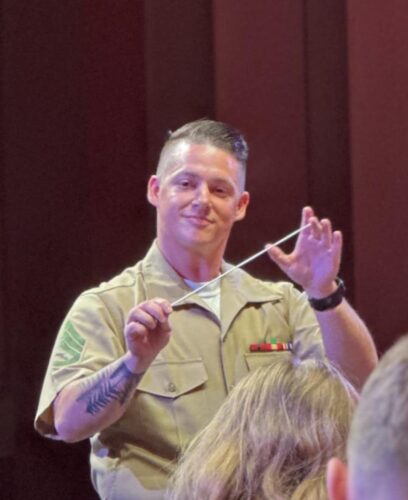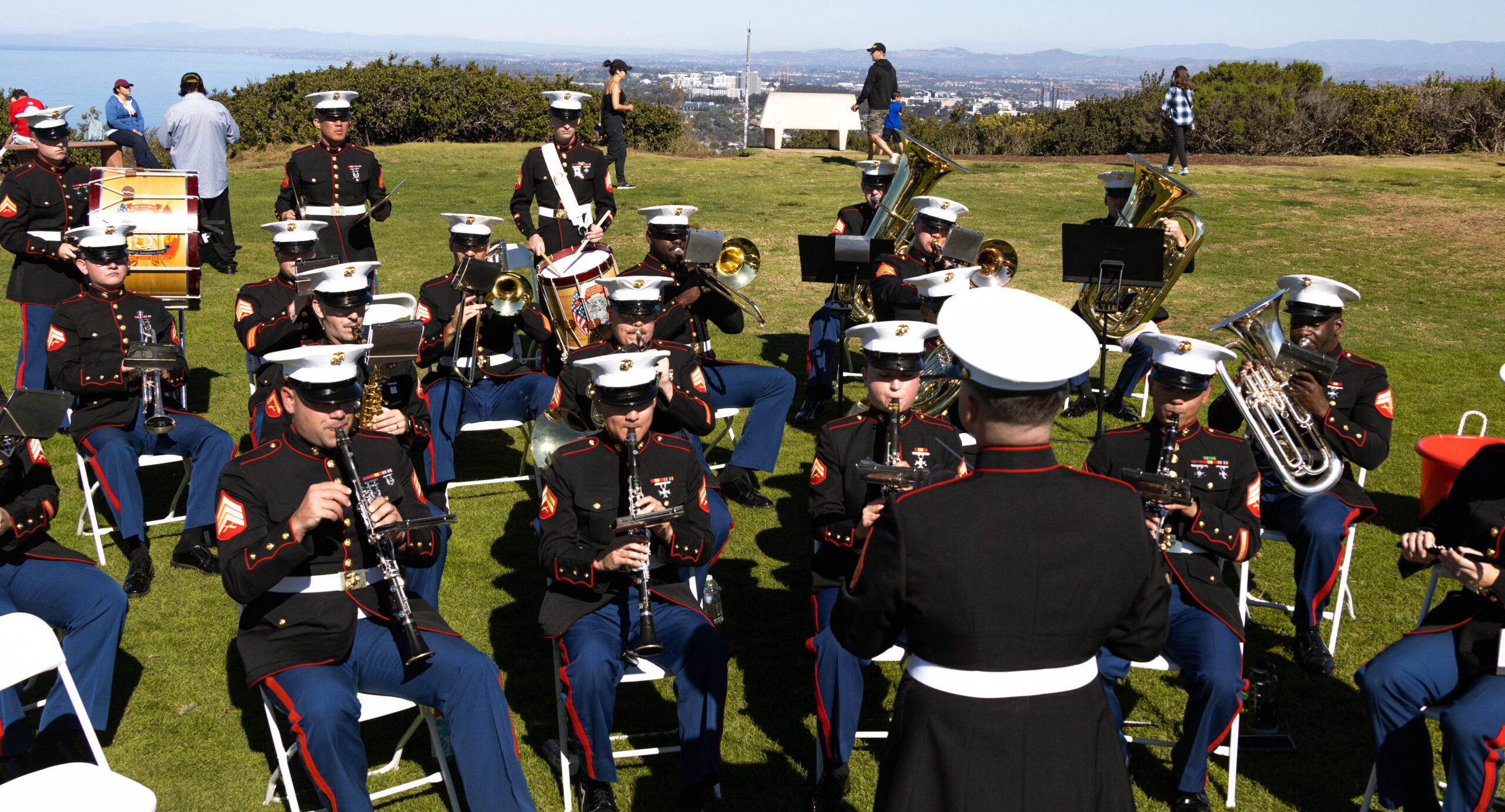Read the other blog posts in our Service Beyond Gender series:
- U.S. Navy Lt. Rae Timberlake’s Mission of Authenticity and Dedication
- As He Prepares to Teach at West Point, Captain Gordon Herrero Reflects on His Leadership Journey
- Major Alivia Stehlik’s Mission of Care and Legacy of Compassion
- Clayton McCallister’s Pursuit of Purpose and Dream of Service
- The Fight to Serve and the Future of the Force
By guest contributor Trish King
For Staff Sergeant Nathan Casey, music has always been more than a passion — it’s a lifeline. From picking up the clarinet as an 11-year-old in Portland, Oregon, to leading the Marine Band San Diego as its Enlisted Conductor (pictured above), his journey is one of harmony, discipline, and resilience.
But Casey’s story goes beyond music. As a trans man in one of the world’s most disciplined military organizations, he’s proving that excellence isn’t defined by gender; it’s defined by commitment, talent, and the ability to inspire others.
Finding Harmony: From Starving Artist to Marine Musician
Before enlisting, Casey dreamed of teaching high school band. Armed with a bachelor’s degree in clarinet performance and music education, he entered a saturated job market that offered little hope for full-time music educators. “I didn’t want to start at the elementary level or move to the middle of nowhere,” he explains. “And I wanted to keep playing my instrument without starving.”
When Casey learned about the Marine Corps music program, it was a revelation. “The idea of serving while doing what I love — it just made sense,” he says. The promise of stability, benefits, and the chance to grow as a musician sealed the deal. In 2014, he joined the Marine Corps and began his journey as a clarinetist in the Quantico Marine Band.
The Art of Leadership: Mentorship and Musicianship
Casey quickly discovered that his musicianship was deeply intertwined with his growth as a leader. “Music teaches discipline, collaboration, and teamwork,” he says. “These are the same qualities you need to succeed as a Marine.”
Over the years, Casey progressed from Section Leader to Enlisted Conductor, a role that requires balancing musical expertise with the demands of leadership. “I’m not required to play anymore, but I still do,” he explains. “Keeping my instrumental skills sharp makes me a better conductor and a more effective leader.”
Mentorship has played a key role in his development. Casey recalled pivotal advice from senior leaders like WO Harper and MSgt Kern. “WO Harper was relentless, but in the best way,” he remembers. “She didn’t accept anything less than great. That kind of standard pushes you to grow.” MSgt Kern, known for his tough-love approach, was equally impactful. “He let me fail, but he also gave me the tools to pick myself back up,” Casey says. “That mentorship shaped who I am as a Marine and as a person.”
Visibility and Representation: Leading From the Podium

Casey conducting
As a trans Marine in a highly visible role, Casey understands the power of representation. “The Marine Corps Band is one of the most public-facing parts of the Corps,” he says. “Even though I may not appear trans, I’m open about it so others can see someone like them excelling.”
Casey’s commitment to visibility was exemplified when he performed with the Marine Band San Diego in the city’s Pride Parade. “It was such a big deal,” he says. “Five years ago, I never would’ve imagined a Marine Corps band participating in Pride, let alone me being part of it. It was an honor to represent both my community and the Corps.”
While Casey has embraced his role as a visible trans leader in the Marine Corps, the backdrop of shifting policies and uncertainty has been an ever-present challenge. The military’s approach to transgender service members has changed dramatically over the past decade, creating an unstable foundation for those simply seeking to serve.
In 2016, the Department of Defense lifted the ban on open transgender service, only for the Trump administration to reinstate it in 2017. That decision sparked years of legal battles and left many service members in limbo. President Biden’s reversal of the ban in 2021 restored the ability for trans individuals to serve openly, but fears of future policy changes remain.
For Casey, the uncertainty is both personal and professional. “We just want to serve like anyone else,” he said. “But when policies can change with an election, it’s hard to plan for the future. You always wonder if your career will be cut short — not because of your performance, but because of who you are.”
This unpredictability isn’t just a bureaucratic hurdle; it takes a toll on morale and readiness. “Being a Marine requires focus and discipline,” Casey explains. “When you’re worried about whether you’ll still be allowed to serve, it’s hard to give your all to the mission. That’s why visibility matters — it’s a reminder that we belong here, no matter what the political landscape looks like.”
Casey also acknowledges the pressure that comes with representing a marginalized community in such a public role. “It’s not just about me — it’s about the people who come after me,” he notes. “I want them to see a future where they don’t have to question whether they belong. They’ll just know.”
A Legacy of Leadership: Building a Future for Marine Corps Music
Casey’s vision for the Marine Corps music program is rooted in inclusivity and excellence. “I want the field to be better; not just musically, but as a community,” he says.
He envisions a future where diversity is celebrated, and identity is simply a footnote to excellence. “I don’t care if my name is remembered,” Casey adds. “I just want to leave a positive mark.”
Part of that vision includes mentoring the next generation of musicians. “I think about what I needed when I was a new Marine,” he says. “Whether it’s helping them navigate their first performance or supporting trans Marines through the challenges they face, I want to make sure they feel supported and valued.”
The Melody Continues
Casey’s journey is a testament to resilience, creativity, and the power of visibility. From his first notes as an 11-year-old clarinetist to leading the Marine Band San Diego, he’s shown that being true to yourself can amplify your impact in any field.
“We’re here to serve, just like everyone else,” he said. “Our identity doesn’t make us less qualified — it makes us stronger.”
For Casey, the road ahead is clear: keep making music, keep leading, and keep showing the world that excellence transcends gender.
About the author: Trish King is a retired U.S. Army infantry NCO and the first openly transgender service member in her field. She writes about military life, family, and LGBTQ+ rights, drawing from her decades of service and personal experience.
Top image credit: U.S. Marine Corps photo by Staff Sgt. Melissa L. Karnath
Know a veteran who’s struggling? Free help available here.
Sponsored by the SSG Fox Suicide Prevention Program
© Copyright modern military association | EIN 52-1845000 | all rights reserved | legal & Financial
